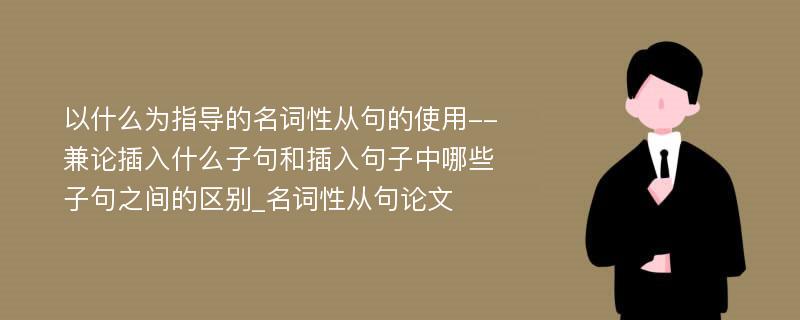
what引导的名词性从句的用途——兼论what从句作插入语与插入句中的which从句的区别,本文主要内容关键词为:从句论文,词性论文,句中论文,用途论文,区别论文,此文献不代表本站观点,内容供学术参考,文章仅供参考阅读下载。
由what引导的名词性从句有七种用途:它可以表示疑问、感叹、泛指或特指,表达“正如/犹如……”或“尽可能多”的意义,并可用作插入语。
1.表示疑问
what引导的名词性从句表示疑问时,是由特殊疑问句转化而来的,此时的what是疑问代词,用作连接代词。例如:
I wonder what made him do it.我不知道是什么使得他做了这件事。(该名词性从句由特殊疑问句“What made him doit ?”转化而来)
2.表示感叹
what引导的名词性从句表示感叹时,是由感叹句转化而来的。例如:
I don't know what a naughty boy he is.我不知道他是那么淘气的男孩。(该名词性从句由感叹句“What a naughty boy he is!”转化而来)
3.表示泛指
what表示泛指时可以泛指某一个人或事物,也可以泛指任何事物或者“凡是……的人”,此时的what是关系代词。例如:
A modern city has been set up in what(=a land that)was a wasteland ten years ago.一座现代化的城市已经在十年前的一块荒地上建立起来了。
You may choose what worker(=whatever worker or any worker that)you like.你喜欢哪个工人就挑哪个。
You may say what(=whatever or anything that)you like.你可以畅所欲言。
4.表示特指
what表示特指时既能特指这/那个人/事物,又能特指这/那些人/事物,也能特指所有的人/事物。例如:
He is no longer what(=the man that)he used to be.他再也不是以前那个样子了。
I told him what(=the thing/things that)we should do next.我告诉他我们下一步该做的事。
When Della reached home she looked at what(=the hair that)was left of her poor hair and started to work on it.德拉回到家,看着她剩下的可怜的头发,开始整理起来。
He deserves it,and for the sake of my love.forget what promise(=the promise that)you made to your wife.他应该得到它,看在我对你的爱上,忘记对你妻子的承诺吧。
She gave him what money(=all the money)she had,although she did not have much.虽然她没有多少钱,但她还是把自己所有的钱都给了他。
注:当what表示特指时,常与few或little搭配,形成what few(仅有的几个)或what little(仅有的一点儿)组合。此时,what few/little=the few/little that。例如:
What few friends(=The few friends that)she has are out of the country.她仅有的几个朋友都在国外。
She managed to save what little morley(=the little money that)she could out of her wages to help her brother.她设法从自己的工资中省下仅有的一点钱来帮助弟弟。
5.表达“正如/犹如……”
此用法常见于句型“A is to B what X is to Y.”。此时的what相当于as many/much,常可用as替换。例如:
Air is to us what water is to fish.空气对于我们犹如水对于鱼。
Two is to four what/as four is to eight.二比四犹如四比八。
6.表示“尽可能多”
what表示尽可能多的意思时等于as many/much…as。例如:
I will give you what help(=as much help as)I can.我会尽力帮助你。
7.用作插入语
what引导的名词性从句作插入语时常用来引起下文、补充上文或承上启下。上文或下文的内容常表达人的喜、怒、哀、乐等感情上的事情。常见的此类插入语有:
what delights/annoys/worries/surpises…sb.(most)…([最]令人高兴/烦恼/担心/吃惊的是……);what is more surprising…(更令人惊奇的是……);what was worse…(更糟糕的是……);what is more important…(更重要的是……);what is better still(更好的是,尤其);what is remarkable(惊人的是);what's even more certain(更确切地说);(and)what's more(况且,而且,此外,还有,更重要的是,更严重的是,更有甚者)。其位置常在句首,也可在句中。例如:
What excites me most(=To my great excitement),Shenzhou Ⅵ has been sent up successfully.最令我兴奋的是神州六号发射成功。
What was even more ccrtain,he didn't speak at the meeting.更确切地说,他没在会议上发言。
He attended the contest and what is more surprising,won a gold medal.他参加了比赛,更令人惊奇的是他赢得了金牌。
She was born in a rich family;what was better still,some of her relatives were famous scholars.她家里有钱,尤其是有些亲戚是著名学者。
These detergents are environmentally friendly,what's more,they're relatively cheap.这些洗涤剂既环保,又相对便宜。
下面是what名词性从句作插入语和插入句中的which从句的区别。
(1)what名词性从句可位于句首或句中,一般不位于句末。which从句不可位于句首,只能位于句中或句末。
(2)what名词性从句位于句首或句中时常表示某种情态或态度。which从句位于句中或句末时用以指代位于其前的先行词或先行句,它的性质是非限制性定语从句。
(3)which从句能表示递进关系,意为“(而/其实/实际上)这/这一点”,相当于and that/this/it;或表示转折关系,相当于but that/this/it,意为“可是这/这一点”。下面举几个插入句中的which从句的例子,可以与上面作插入语的what名词性从句比较。
York,which I visited last year,is a nice cold city.约克是一座美丽和寒冷的城市,去年我去过。
—Whose overcoat is it?这是谁的大衣?
—Maybe it's Julia's.She likes to wear,which was very uncommon in this small country,a bright red overcoat.也许是Julia的。她喜欢穿鲜红色的大衣,这种衣服在这个小乡村很罕见。(which从句置于被修饰词的前面,指代“a bright red overcoat”)
If,which seldom happens,he would repent,he would be a good boy.=If he would repent,he would be a good boy,which seldom happens.如果他愿意忏悔,他会是个好孩子,可是,这样的情形很罕见。(which从句置于句中,指代整个句子,即“If he would repent,he would be a good boy.”)
The meeting was put off which(=and that/this/it)was exactly what we wanted,会议被推迟了,这正是我们所希望的。(which从句置于句末,指代整个主句,表示递进关系)
John said he'd been working in the office for an hour,which(=and that/this/it)was true.约翰说他在办公室工作一个小时了,这是真的。(which从句置于句末,指代主句的部分内容,即宾语从句的内容,表示递进关系)
I asked him to lend me his bike,which he did(=and he did so).我请他把自行车借给我,他就借给我了。(which指代主句的部分内容,表示递进关系)
She was very patient towards the children,which(=but...so)her husband seldom was.她对待孩子很有耐心,可是她丈夫却很少如此耐心。(which指代主句中表语的内容,表示转折关系)
Her sister has become a lawyer,which(=and...so)she wanted to be.她姐姐已经当上了律师,而律师这个职业是她以前所向往的。(which指代主句中表语部分的a lawyer,表示递进关系)
注:在非正式的文体中或紧跟在直接引语之后,which还可以大写,用来引导一个句子,指代前句的整个内容。例如:
He was fined $500.which we all thought served him right.他被罚款500美元,我们都认为他活该。
She said,“I've done my best.”Which was true.她说:“我已尽力了。”她确实尽力了。
